|
|
|
Sort Order |
|
|
|
Items / Page
|
|
|
|
|
|
|
| Srl | Item |
| 1 |
ID:
081754
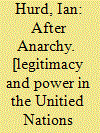

|
|
|
|
|
| Publication |
Princeton, Princeton University Press, 2007.
|
| Description |
ix, 221p.
|
| Standard Number |
9780691128665
|
|
|
|
|
|
|
|
|
|
|
|
Copies: C:1/I:0,R:0,Q:0
Circulation
| Accession# | Call# | Current Location | Status | Policy | Location |
| 053635 | 320.11/HUR 053635 | Main | On Shelf | General | |
|
|
|
|
| 2 |
ID:
077884
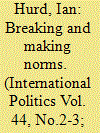

|
|
|
|
|
| Publication |
2007.
|
| Summary/Abstract |
International norms are influential when they are seen as legitimate, and recent American behaviour may undermine the legitimacy of norms on the use of force. I examine three kinds of legitimacy crisis that might arise from American revisionism. First, the US threatens to delegitimate the norms that it challenges, particularly on military preemption. Second, it threatens to undermine its own influence by disassociating American power from one source of legitimation. Finally, it may negate the basic idea of American hegemony as that term is understood in constructivist scholarship and so transform the structure of the international system. Any of these might lead to a crisis, though of different kinds. The American challenge to the customary law on preemption threatens to delegitimize both the existing norms and the social basis of US power, while also attempting to legitimize American interests and new understandings of the norms. It therefore shows the productive and destructive aspects of the power of legitimation in world politics. Legitimation is the link between states and the normative structures of international society
|
|
|
|
|
|
|
|
|
|
|
|
|
|
|
|
| 3 |
ID:
145078


|
|
|
|
|
| Summary/Abstract |
The legalization of world politics is often celebrated for reducing impunity for those who contribute to humanitarian crises. This may sometimes be true but the opposite is also true. In 2010, United Nations peacekeepers unwittingly brought cholera to Haiti and sparked an epidemic. Nearly a million people were made sick and 8,500 died. Legal activists have sought to hold the UN responsible for the harms it caused and win compensation for the cholera victims. However, these efforts have been stymied by the structures of public international law—particularly UN immunity—which effectively insulate the organization from accountability. In short, the UN is empowered, and the cholera victims disempowered, by legalization. The Haiti case powerfully illustrates the dangers of legalism, which have been largely overlooked in discussions of international law, and suggests that law alone is an inadequate arbiter of responsibility in international politics.
|
|
|
|
|
|
|
|
|
|
|
|
|
|
|
|
| 4 |
ID:
108092
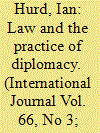

|
|
|
| 5 |
ID:
081550
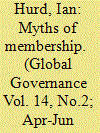

|
|
|
|
|
| Publication |
2008.
|
| Summary/Abstract |
The need to expand the UN Security Council is usually justified as necessary to update Council membership in light of changes in world politics. The mismatch between the existing membership and the increasingly diverse population of states is said to delegitimatize the Council. This rests on an implicit hypothesis about the source of institutional legitimacy. This article surveys reform proposals and finds five distinct claims about the connection between membership and legitimacy, each of which is either logically inconsistent or empirically implausible. If formal membership is indeed the key to institutional legitimacy, the causal link remains at best indeterminate, and we may have to look elsewhere for a theory of legitimation. We must also look for explanations for why the language of legitimation is so prevalent in the rhetoric of Council reform.
|
|
|
|
|
|
|
|
|
|
|
|
|
|
|
|
| 6 |
ID:
151568
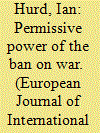

|
|
|
|
|
| Summary/Abstract |
The ban on inter-state war in the UN Charter is widely identified as central to the modern international order–Michael Byers calls it ‘one of the twentieth century’s greatest achievements’. Even if it is only imperfectly observed, it is often seen as a constraint on state autonomy and an improvement on the pre-legal, unregulated world before 1945. In response to this conventional view, this article shows that the laws on war in the Charter are better seen as permissive rather than constraining. I make two points. First, by creating a legal category around ‘self-defence’, the laws on war authorise, and thus legitimate, wars that are motivated by the security needs of the state, while forbidding other motives for wars. Second, state practice since 1945 has expanded the scope of this authorisation, extending it in both time and space beyond the black-letter text of the Charter. The permissive effect of law on war has therefore been getting larger. These two effects suggest that international law is a resource that increases state power, at least for powerful states, and this relation between international law and power politics is missed by both realists and liberal internationalists.
|
|
|
|
|
|
|
|
|
|
|
|
|
|
|
|
| 7 |
ID:
066350
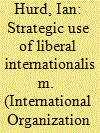

|
|
|
| 8 |
ID:
153889
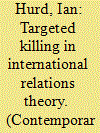

|
|
|
|
|
| Summary/Abstract |
As new technologies make possible new modes of war, they cause tension in the previously prevailing conceptual categories. This is evident, as the practice of targeted killing by governments has increased in frequency and prominence, largely due to the American use of armed drones around the world. The essays in this special issue explore how norms, rules, and laws that many people thought were settled have been roiled by new technologies of targeted killing. This includes rules on sovereignty, territory, due process, and the distinction between civilian and combatant. The essays sketch an implicit research program around the recursive relation between rules and practice. I draw these out into a more general model for scholarship at the boundaries between law and politics and between concepts and practices.
|
|
|
|
|
|
|
|
|
|
|
|
|
|
|
|
| 9 |
ID:
133958
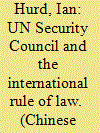

|
|
|
|
|
| Publication |
2014.
|
| Summary/Abstract |
This article considers the relationship between international law and the UN Security Council. The practical power of the Council is constituted at the intersection of its legal framing, its political legitimacy, and the interests of powerful states. This sometimes means the Council has less power than is assigned to it by the UN Charter, but it often means that it has more. It is clear that the Council sits within the international legal system, the legal limits on its action are interpreted in light of prior Council practice, and thus the meaning of 'compliance' and 'violation' of the Charter changes over time. Some transgressions of the Charter are understood as informal amendments to it; others are seen as threats to international peace and security that impel enforcement action. This ambiguity in the law and practice of the United Nations is inherent in the idea of the 'international rule of law'. The Council straddles the unstable boundary between international law and politics, both undermining and reinforcing the distinction between them.
|
|
|
|
|
|
|
|
|
|
|
|
|
|
|
|
|
|
|
|
|